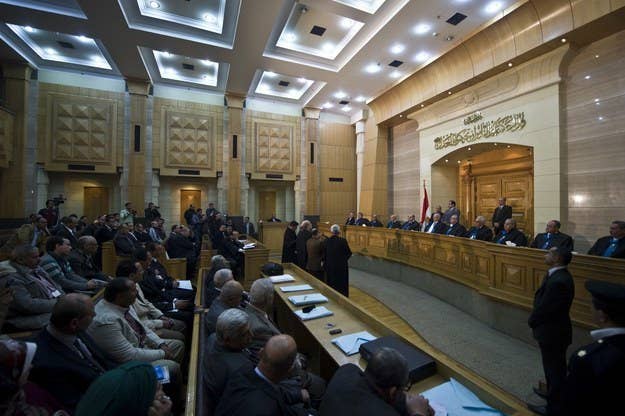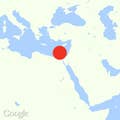
In late May, Egyptian judge Mohamed Yousry logged on to Facebook and uploaded a photo of himself, in which he was carrying a gun. In the caption, he wrote:
"My gun is loaded. I swear if anyone comes near me, I will kill him."
Yousry is one of the several Egyptian judges who, in recent weeks, have started taking precautionary steps after four judges were targeted in the last two months. Another three have been assassinated.
"I took the badges identifying me as a judge off of my car," a 40-year-old judge in Cairo, who did not want to be identified for personal safety reasons, told BuzzFeed News. "I fear someone on a motorcycle would shoot me while driving."
Violent attacks in Egypt have been on the rise since the fall of Mubarak's 30-year regime and subsequent removal of the Muslim Brotherhood from power. Bombings in the Sinai Peninsula targeting police and military installations quickly spread to gunfights in Egypt's largest city centers. Judges, long spared from the violence, became high-profile targets for assassinations in their own right as they made headlines for handing down mass death sentences at unprecedented rates, leading many in Egypt to accuse the judicial system of playing into the hands of Egypt's military leaders.
In March 2014, an Egyptian judge handed out a collective death sentence to 183 people; one month later, the same judge broke his own record and sentenced 683 to death during a mass trial. This year, Muslim Brotherhood leader Mohammed Badie was among 37 men whose sentence was upheld by Egypt's mufti, a religious figure responsible for ratifying death sentences.
The collective death and jail sentences handed out by the judiciary have made the judges involved in the decisions key adversaries.
"Enough ignominy," said 19-year-old Mohammed, a member of the Muslim Brotherhood and law student, on the death verdict of the Brotherhood leaders. Mohammed spoke to BuzzFeed News and requested to be identified with only his first name due to the ongoing threat to Brotherhood members. He said the only means available to the Islamist group to challenge the state was through its representatives in the judiciary, police, and army.
"Their blood is no more precious than those who have lost their lives," he said, referring to the lives lost during the protests in 2013. Publicly, the Brotherhood's top leadership has stopped short of condoning violence, though their Arabic-language social media pages often carry a harsher tone than their English-language variations.
Two weeks ago, a judge referred former Egyptian president Mohammed Morsi to the mufti to ratify a death sentence. Immediately following the decision, the spokesperson of the Muslim Brotherhood issued a statement on the same day on his Facebook account, calling for avenging the executed. "Nothing is useful now but revenge," he wrote, calling on the revolutionary youth to "chop the heads off the decaying bodies."
The same day, three judges were targeted in Sinai by Ansar Bayt al-Maqdis, an offshoot of the Islamic State. The group later released a statement saying the assassination was in retaliation for the death verdict issued for Morsi.
Muhammad Shahba, a human rights lawyer based in Cairo, describes the current situation as an unprecedented tension between the judicial estate and political opposition.
"The farcical death and jail verdicts, whether for members of the Muslim Brotherhood or any opposition of the president, cast shadows of doubt on the status of the judiciary as an independent estate," he said.

